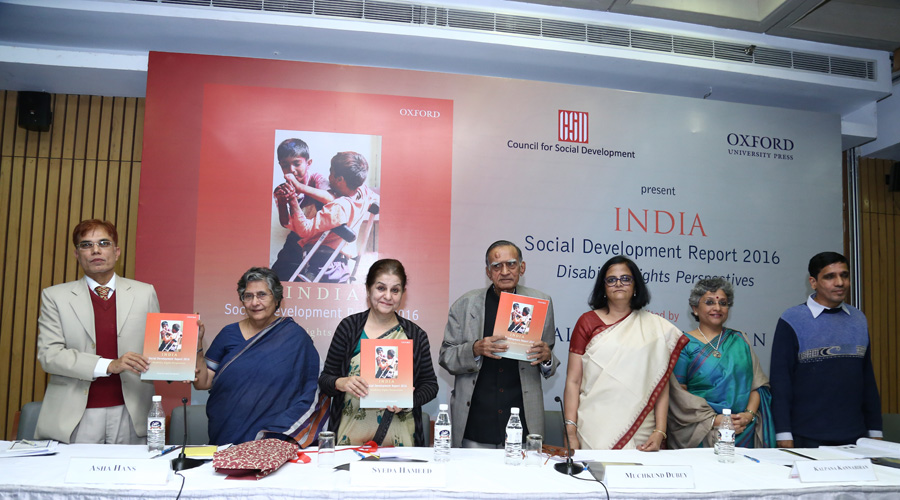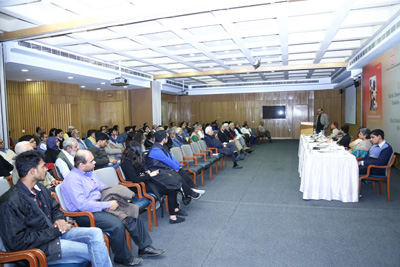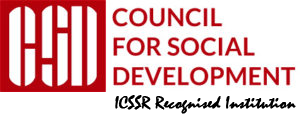 Renowned Bangladeshi singer Ms Farida Parveen sings Lalan Geeti in Bangla and Hindi translation of Lalan Shah Fakir’s selected songs by Prof. Muchkund Dubey
Renowned Bangladeshi singer Ms Farida Parveen sings Lalan Geeti in Bangla and Hindi translation of Lalan Shah Fakir’s selected songs by Prof. Muchkund Dubey
Date: June 2, 2017
Time: 3 to 5 pm
Venue: India International Centre
Bandung Day
Date: April 24, 2017 (Monday)
Time: 3 pm
Venue: CD Deshmukh Auditorium, Max Muller Marg
Bandung Day 2017
Bandung Day 2017
New Delhi. A symposium was organised on 24 April by Council for Social Development (CSD), India International Centre, and South Solidarity Initiative of Action Aid India to commemorate the Bandung Declaration of Ten Principles adopted by Asian and African countries on this day in 1955. The panel at the symposium included eminent academics who reflected on the current state of the multilateral order, and posited ideas for a new multilateralism which is dynamic, equitable and most importantly, based on the ideals underpinning the formation of the United Nations.Panelists recalled the significance of the Bandung Conference where developing countries committed to peace, sovereignty, and solidarity for the economic and social development of their people, and which propelled other historical moments such as the formation of the Non-aligned movement. Prof Muchkund Dubey, President of CSD and former Foreign Secretary expressed disappointment that the values that marked this multilateralism have since drastically eroded and the institutional structure enfeebled. He said that unilateralism cannot be supplanted by plurilateralism- a few dominant powers shaping global governance- under any circumstances, and the solution to the rupture in the world order is a democratic form of multilateralism.
Reflecting on the crisis of the global economic order and its contributing factors, Prof Sunanda Sen, former Professor of Economics at JNU and ICSSR National Fellow highlighted the unfinished project of the economic autonomy of the South, which was partly a reaction to the uneven terms of trade imposed by developed countries, and partly a search for self-reliance, but was abandoned in the 1980s leading to the continued impoverishment of the global South. Prof B.S. Chimni, Professor of International Law at JNU questioned whether the prevailing form of multilateralism is serving the global common good, when a small minority is reaping the benefits of globalization to the detriment of the many. He too cautioned against moving towards unilateralism due to the failings of the current world order. In addition,Prof Manoranjan Mohanty, former Professor of Political Science at Delhi University pointed out that the three greatest challenges facing the world today namely, terrorism, climate change, and rising inequalities merit greater multilateralism than ever before. Therefore, developing countries and so-called Southern forums such as BRICS need to reaffirm the Bandung spirit and work closely together.
The audience was also addressed by the Ambassador of Venezuela, H. E. Augusto Montiel. He reiterated the need to revitalize the movement and principles of Bandung, and also exhorted states to revisit the vision of multilateralism enshrined in the UN charter to ensure co-existence with dignity and prosperity.
Bandung Day 2016
The Idea of Universal Basic Income
Speakers: Professor Gerry Rodgers, Professor Imrana Qadeer & Professor Ashok Pankaj
Chair: Professor Muchkund Dubey
Date: April 6, 2017 (Thursday)
Time: 3-5.30 pm
Venue: Durgabai Deshmukh Memorial Lecture Hall, CSD, Sangha Rachna, 53 Lodi Estate, New Delhi 110003
Annual Discussion on Union Budget 2017-18
Annual Discussion on Union Budget 2017-18
Date: February 23, 2017
Time: 11 am to 5.30 pm
Venue: Durgabai Deshmukh Memorial Lecture Hall
Forthcoming Elections in UP: Promises and Possibilities
Forthcoming Elections in UP: Promises and Possibilities
Speakers: Professor Sanjay Kumar & Professor Badri Narayan
Chair: Professor Manoranjan Mohanty
Date: January 25, 2017 (Wednesday)
Time: 3.00 pm
Venue: Durgabai Deshmukh Memorial Lecture Hall, CSD,
Sangha Rachna, 53 Lodi Estate, New Delhi 110003
About the Speakers
India’s Black Economy: Implications, Causes and Remedies
India’s Black Economy: Implications, Causes and Remedies
Speaker: Professor Arun Kumar
Chair: Professor Muchkund Dubey
Date: December 22, 2016 (Thursday)
Time: 3.30 pm
Venue: Durgabai Deshmukh Memorial Lecture Hall, CSD,
Sangha Rachna, 53 Lodi Estate, New Delhi 110003
Training Course on Research Methodology in Social Sciences
12th – 23rd December, 2016
Venue: Council for Social Development, New Delhi
Last Date of Application: 8 December 2016
CSD in the News
- CSD mourns demise of Dr. P.M. Bhargava
Read More… - Durgabai Deshmukh Memorial Lecture 2017
Read More… - Prof. B.B.Kumar guest of honour address
Read More… - RTE Conference 2017
Read More… - Bandung Day 2017
Read More… - India: Social Development Report 2016
Read More… - Study Seeks To Bridge Gap Between Mainstream Social Activism, Disability Rights
Read More…
India: Social Development Report 2016

India: Social Development Report published by the Oxford University Press is a bi-annual publication of the Council for Social Development (CSD), New Delhi. The CSD has been publishing its Social Development Report since 2006. Each report, apart from giving an overall view of the social situation in the country deals, in greater detail, with a selected theme of social development. This year’s theme is “Disability Rights Perspectives”. The earlier Reports had focussed on Child Rights and Development (2006), Project Related Displacement and Resettlement (2008), Land and the Marginalised (2010), Minority Rights (2012) and Challenges of Public Health (2014).
This latest Report has been co-edited by Professor Asha Hans and Professor Kalpana Kannibaran, Regional Director, Southern Regional Centre, CSD. It was released by Dr Syeda Hameed, eminent social and women’s rights activist and former Member of the Planning Commission of India.
The context of this latest volume is set by the deliberations around the U.N. Convention on the Right of Persons with Disabilities and its ratification by India on October 1, 2007, and by the consequent debate in the country on bringing the disability law in India in conformity with the U.N. Convention. The significance of the release of this Report at this time is underlined by the fact that it has come just two days after the observation of the International Day of Persons with Disability and almost immediately after the decision of the Union Cabinet to introduce extensive amendments in our disability law.
 The Report released today deals with the dimensions, problems and policy measures for the disabled population in India. Almost all the papers included in the thematic section of the Report contain the analysis and findings of new research commissioned for the Report, on conceptualisation of disability, gaps in the data relating to this problem, diversity and the plurality of disability prevailing in the country, the problem faced by the disabled in different sectors of activities particularly education, health and employment and perspectives on the rights of the disabled as contained in the relevant International Convention and national laws. The Report forcefully argues that the problem of the disabled is not merely that of deprivations, discrimination and denial but also of violation of their human rights.
The Report released today deals with the dimensions, problems and policy measures for the disabled population in India. Almost all the papers included in the thematic section of the Report contain the analysis and findings of new research commissioned for the Report, on conceptualisation of disability, gaps in the data relating to this problem, diversity and the plurality of disability prevailing in the country, the problem faced by the disabled in different sectors of activities particularly education, health and employment and perspectives on the rights of the disabled as contained in the relevant International Convention and national laws. The Report forcefully argues that the problem of the disabled is not merely that of deprivations, discrimination and denial but also of violation of their human rights.
The disabled constitute 2.2 per cent of India’s population according to the 2011 Census. In absolute number, it is more than the population of a large number of countries of the world. State-wise disability figure show that while the absolute number of persons with disability is the highest in U.P., Maharashtra, Andhra Pradesh and West Bengal, the ratio of disabled to the total population is highest in Sikkim, Orissa and Jammu & Kashmir.
As in the previous Social Development Reports, this Report also contains in a separate Chapter the measurement of progress of various States and social groups across the rural and urban areas in terms of 29 indicators within selected dimensions of social development i.e. demography, health, education and basic amenities. We aggregate these indicators, after making statistical corrections into a single index and rank states and social groups according to this index. These indices are prepared separately for rural and urban areas, for social groups like Scheduled Castes and Scheduled Tribes and male and female.
Please visit link below to access the story:
• http://www.thehindu.com/education/Disabled-children-miss-out-due-to-lack-of-support-services-Report/article16787022.ece#comments
• http://www.newindianexpress.com/states/telangana/2016/dec/08/societys-understanding-of-disability-an-aberration-1546895.html
• http://thewire.in/85002/disability-rights-social-activism/

